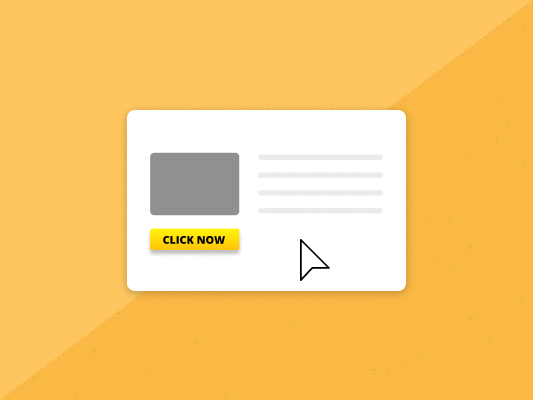A brand awareness campaign is to build awareness of your brand, products, and services to your targeted audience. You can increase brand awareness with PPC easily with these 4 simple tips!
Whenever you visit a restaurant, do you ask for a soft drink, or do you order a Coke or Pepsi?
When you need to buy some perfume, do you go for Fara or Dolce & Gabbana?
What do these statements signify?
And how are they related to pay per click and brand awareness?
Let’s find out how you could use PPC for brand awareness!
The terms we’ve mentioned are well-established brands that have grown to the point that they can influence customers’ decisions when they purchase items within the brand’s niche.
These well-established brands enjoy the privilege of controlling a greater percentage of the market.
To get to this point, companies grow their brand through several strategic systems like direct marketing, social media marketing, brand partnerships, influencer marketing, advertising, etc.
These strategies are meant to bring about more brand awareness which could help boost direct sales and conversions.
Brand Awareness
Brand awareness can be described as the level of association or recognition that a potential customer has regarding your products or services.
If you think of a cold drink, the chances are that you are probably thinking about a Coke or Pepsi.
Brand awareness is meant to influence the customer’s thoughts to such a point that anytime they think of some product related to your niche, your product is the first thing that comes to their mind.
The best way to increase your brand awareness for your eCommerce store is through pay per click ads or PPC.
Pay-per-Click

Pay per click (PPC) refers to a paid advertising model on the internet that drives traffic to relevant websites.
The advertiser pays the publisher every time the advertisement is clicked hence the term pay per click.
In this model, advertisers often bid for keywords that they’ve analyzed and found to contain enough traffic related to the content in their eCommerce websites.
Every time users do searches using the targeted keyword, they get an ad that redirects them to the advertiser’s website.
PPC is a great form of digital marketing campaigns since it can help increase leads in s very short time.
How does brand awareness with PPC work?
PPC For Brand Awareness
The two main ranking strategies great for eCommerce websites are organic ranking and PPC.
While organic ranking takes some time to take effect, PPC often expedites the process putting your website ahead of your competitors.
How to Improve Brand Awareness With PPC?
When done correctly, PPC campaigns could help place your brand directly in front of your target audience.
The more times your target audience sees your advertisement, the higher the chances that they’ll click through to your website and get more information about what your brand is all about.
PPC ads are not only meant for redirecting traffic to your sales page.
While this may boost your conversion rate, the chances are that your target customers may not know what makes your company unique.
You could use ads that redirect your customers to a brief informatory section about your company.
This could help score lots of brand awareness and loyal customers.
You could offer to compensate them for their time using incentives such as discounts and other offers.
Google Ads offers PPC campaigns where you get to bid on keywords that you could target to your potential customers.

Google processes 1.2 trillion searches yearly, and the number keeps rising.
Bidding on these keywords could give you access to a huge percentage of potential customers yearly.
Google Ads cover the searchable web (when users type in search queries that have related keywords), videos on platforms such as YouTube, and websites (advertisements related to the user’s browsing activities that pop up in websites that the user is currently using).
You could also do your PPC campaigns through social media platforms.
You could identify apps such as Facebook or Instagram that your potential customers are likely to use the most and place your PPC campaigns.

The chances are high that you’ll get high click-through rates and substantial conversions.
Measuring Brand Awareness Campaign Goals
You could use many metrics to measure your brand awareness achievements in PPC campaigns.
The most popular metrics used to measure your campaign’s success include click volume, conversion rates, and cost per click.
However, since we are more focused on increasing brand awareness with PPC, these three metrics will need more attention.
These metrics include:
Impressions
Think of that one moment today or this week when you met someone on the train but didn’t talk to them.
Try to remember the look on their face.
Was it happy, sad, or angry?
Whatever their look was, you do remember them.
That’s what the term impressions mean in marketing.
Impressions mean the number of times that your ad is fetched from its source.
It doesn’t matter if the user clicked the ad or whether the user made a purchase that directly resulted from them clicking on the ad.
What matters is that the ad left a lasting impression on your intended target audience.
The calculations for impression are made under the assumption that people connected with your ad whether or not they clicked on it.
However, they are still quite important since the more the user sees your advertisement, the higher the chances they’ll click on it, especially if it’s relevant.
Reach and frequency
Both reach and frequency are two of the most important elements of advertising.
They are both intertwined where one informs you of the number of people that your advertisement managed to reach while the other informs you of the frequency attained by the ads.
Reach and frequency could be used to measure the gross rating points or GRP.
This term refers to the size of the audience reached by a particular advertising vehicle.
You could calculate the GRP by getting the average percentage of the target audience reached by the ads’ frequency.
For instance, if the ad reached 45% of the audience and the ad was displayed ten times.
Then the GRP= (45%x10), which is 450.
You could also use the TRP metric, which also helps you figure out other information that may be useful, such as the target’s age brackets, gender, etc.
Click-through rate

The click-through rate refers to the number of impressions your ad gets divided by the number of clicks the ad generates.
This metric could be used to analyze your PPC ad campaign and determine its performance.
For instance, if you have 200 impressions and out of these impressions your ad managed to get 20 clicks, your click-through rate calculations should be as follows.
Clicks / impressions = CTR.
200 / 20 = 10%.
The average CTR is around 1.91% for web search and 0.35% for other display platforms.
However, that’s just the average.
The best thing would be getting a CTR of 4% to 5% on web searches and 0.5% to 1% on other display platforms.
How do you boost your CTR rate?
Click here to find out.
Tips For Growing Brand Awareness With PPC
Using PPC for brand awareness growth offers you great opportunities.
However, it would be great to keep in mind that the ultimate goal is to boost your reputation, eventually helping you drive sales.
Focusing on the bigger picture helps you make strategic decisions meant to help you achieve your goal.
1. Know who your target market is
![The 10 Qualities Of A Good Inbound Marketer [Infographic] « SEOPressor – WordPress SEO Plugin](https://seopressor.com/wp-content/uploads/2015/09/target-audience.jpg)
Before starting your PPC brand awareness marketing campaign, the first thing you have to do is understand your target audience, i.e., your prospective customers.
You’ll need to know what they like, their purchase procedure, how they search for products, and even what platforms they like to socialize on.
Analyzing your potential customer helps you develop strategic marketing techniques and content that is tailored and more likely to drive conversions.
This is a better strategy instead of trying to blindly guess what your prospective buyer possibly likes, where they are, and how you can market to them.
Since your marketing campaign deals with PPC, it would be great to analyze your target and hit them with the most relevant ads that are most likely to pay off.
Otherwise, you could lose your investment due to low conversions.
2. Use different platforms
Diversifying the number of platforms you use for your PPC for brand awareness campaigns could prove very advantageous in the long run.
Different PPC platforms allow you to target different groups of customers.
Besides Google Ads, you could also use Facebook or Instagram for your PPC campaign.
Analyzing these social platforms could allow you to tailor your ads to fit your target audience.
For instance, the amount of Facebook users aged 25 years to 34 years old is 19%, which is the biggest demographic. 13.1% of these users are female.
If your product or service was especially useful to this specific group of people, then you could have found the perfect platform for your PPC for the brand awareness campaign.
However, you don’t have to stop there.
You could analyze other platforms and find these that are likely to give you the highest return on investment.
3. Use the right keywords and phrases

PPC campaigns rely on keywords, and the most relevant keywords you pick, the higher chances you have for getting more traffic, more impressions, click-through rates, and conversions.
Using random keywords does not only increase your campaign’s costs.
But it doesn’t result in a return on investment.
If you want to reduce your PPC campaign cost, you’ll need to do some research and choose the best keywords that are most relevant to your niche.
Your keywords should have the highest potential for traffic and, at the same time, low competition.
You also need to analyze and figure out the best platforms for various ads.
Some platforms like web searches may have users who want to get information regarding your product or service.
You could redirect such potential customers to a page that contains more info about your brand.
Other platforms like social media websites have users who may want to make a quick purchase.
Redirecting such potential customers directly to your sales page could help you make more conversions.
This is because the customers are eager to purchase the product and go back to their social media platform.
How do you choose the right keyword for your PPC campaign?
BiQ’s Keyword Intelligence

BiQ’s Keyword Intelligence is one feature among three others in BiQ’s SEO Suite.
BiQ’s keyword analysis feature could help you come up with the best keywords for your PPC campaign.
Why do I say that?
Researching with BiQ’s Keyword Intelligence provides you with various analytical data that you could use to choose the most relevant keyword to use for your campaign.
You get data such as keyword volume, keyword competition, related keywords, trends, etc.
The keyword analyzer feature also helps you understand the keyword’s search intent.
You get to know why someone may be searching using the keyword.
They may be doing this for informational, transactional, or navigational purposes.
You could use this information to redirect them to the most relevant page on your website.
If you aren’t sure which keyword is the best for your PPC for brand awareness campaigns, you could choose one with the highest value.
High valued keywords are those that have the potential to bring in more traffic at a reduced competition.
If you want to know how you could use BiQ’s Keyword Intelligence to perform your keyword research, you could check out this other page!
4. Include the right information
It can be quite easy to get lost in your creativity when crafting your ads.
However, it would be great to ensure that the ads are focused on the right content.
Otherwise, you may end up investing lots of cash on a PPC campaign that may not yield any returns.
Please make sure to display your company’s information, logo, slogan, and address where applicable.
This information serves to help your customers get to know your company better.
After all, the endgame of using PPC is increasing your brand’s awareness.
Conclusion
Pay per click has been known to boost sales within a very short period.
However, you could use it to boost your company’s brand awareness with PPC if you know how to manipulate the system.
You could get more people talking about your company and buying your merchandise simultaneously!




